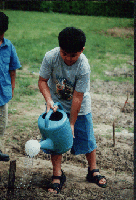
Our curriculum identifies
a variety of learning expectations. Among these are expectations related to
children’s development of literacy (including technological and computer
literacy) and of knowledge and skills in mathematics and science. To enable
children to meet these expectations, learning opportunities must promote the
growth of students’ reasoning, creative thinking, and inquiry skills.
Experiences that require problem solving and critical thinking are central to
the development of these skills, as are hands-on experiences with concrete
materials, which prepare children for learning abstract concepts. Planned
activities will enable and encourage children to explore, create, question,
predict, attempt, analyze, and reflect. Learning experiences in the Kindergarten
years must provide the foundation that children will need to succeed in an
international school setting for Grades 1 to 8.
In each child, the intellectual, physical, social, emotional, and creative dimensions are interrelated. In order to address all dimensions of the child, the Kindergarten program will also include opportunities for self-expression and self-discovery through music, drama, and language activities, as well as for co-operative activities with peers.
Young children learn best
through activities that are relevant to their lives and varied enough to be
stimulating. Learning opportunities should build upon children’s past
experiences and the learning they have already acquired, and should be planned
to accommodate the children’s changing needs, interests, and circumstances, as
well as the exploration of significant occurrences in their lives.
All school experiences
can promote the attainment of the learning expectations, including practices
related to safety, outdoor play, conduct, out-of-class trips, and participation
in such school events as assemblies and concerts. The community, too, is a good
source of learning opportunities; teachers should plan activities that involve
members of the community as resource persons and that allow children to
participate in the life of the community.
Prior to
Kindergarten, most children know learning as a pleasurable experience, so that
they are naturally inclined and even eager to learn when they first come to
school. It is important that the Kindergarten program reinforces and builds on
this positive attitude by offering varied, stimulating, and enjoyable
experiences. It should also prepare children for later grades by encouraging
them to recognize and explore opportunities for learning and to persevere with
challenging tasks.